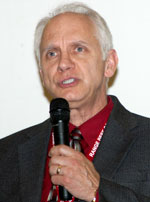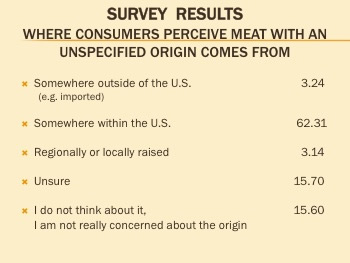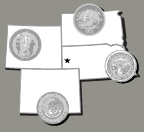Source Verification Important
to Steak Customers
by Kasey Miller, for Angus Productions Inc.
MITCHELL, Neb. (Nov. 30, 2011) — Consumers are more informed about where their food comes from, and a study from the University of Nebraska–Lincoln, the Nebraska Department of Agriculture, and the University of Adelaide says that they are willing to pay more for a source-verified steak.

Chris Caulkins
Chris Calkins, Nebraska beef industy professor at the University of Nebraska–Lincoln, reported that consumers use source verfication as a way to guarantee quality and safety. They like to know where it comes from and how it is produced.
The research team sent an online survey to more than 1,000 participants who had dined at high-end restaurants and had six steak tasting events in the Southwest and the East Coast.
The taste test offered participants four options of steaks (including farm-verified, state-verified, region-verified and generic). A different price was randomly assigned to each steak so that price wasn’t the main determining factor.
Participants were asked to write down their reasoning for selecting their steak, and also filled out a brief survey after dining.
The online survey responses indicated that most participants dined out two to three times a week (30%) or weekly (28%). The participants were beef eaters, with the majority consuming beef on a weekly basis in and outside the home. Filet mignon was the most preferred cut at 41%.
An interesting fact was that 41% said that sometimes they seek advice from others when not sure of what to order. Of those, 92% ask their server or a member of the waitstaff. Calkins asserted that this could be an advantage for the beef industry.
“In those high-end restaurants, that waitstaff considers themselves to be professionals; and in my assessment, they were anxious and interested and open to learn about the product they were serving,” said Calkins.
Participants who were uninformed of the origin of their meat mostly assume it was from somewhere in the United States (62%). Many (39%) wanted to know the state of origin, and 38% wanted to know the country of origin.
 “Customers use source verification to indicate other things about that product,” he said, “and that’s where it has its value.”
“Customers use source verification to indicate other things about that product,” he said, “and that’s where it has its value.”
State-of-origin and farm-of-origin steaks were the most ordered regardless of price — two-thirds preferred steaks with more specific origin. Participants’ perceptions of state-of-origin, Nebraska Source-Verified Beef, were that it was a of high-quality, corn/grain-fed, USDA Choice or Prime, flavorful, very tender, from farmers who care about the land and animals, a brand they would trust, lean, high nutritional value and always satisfying.
More than 70% said they would be willing to pay an extra $8.75 for farm-of-origin steak in high-end restaurants, and an extra $4.74 for steaks with known state of origin.
To see Calkins' PowerPoint presentation, click here.
The biennial Range Beef Cow Symposium was hosted Nov. 29-Dec. 1 at the Mitchell Events Center, Mitchell, Neb., by the cooperative extension and animal science departments of the University of Nebraska-Lincoln, South Dakota State University, Colorado State University and the University of Wyoming. Comprehensive coverage of the event is provided online at www.rangebeefcow.com, an event coverage site provided by Angus Productions Inc. (API), publisher of the Angus Journal and the Angus Beef Bulletin.
Editor’s Note: API's coverage of the event is made available for distribution to all media via an agreement with the Range Beef Cow Symposium Committee and API. Headquartered in Saint Joseph, Mo., API publishes the Angus Journal, the Angus Beef Bulletin, the Angus Beef Bulletin EXTRA, and the Angus e-List, as well as providing online coverage of events and topics pertinent to cattlemen through the API Virtual Library. For questions about this site, or to notifiy us of broken links, click here.
Calkins said that there appears to be a demand for Nebraska source-verified product, and this model could be applied to other states to create a demand for their product.

